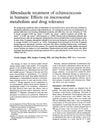75 citations,
September 2015 in “Acta biomaterialia” Alkylation of human hair keratin allows for adjustable drug release rates in hydrogels for medical use.
 75 citations,
July 2013 in “The Journal of Clinical Endocrinology and Metabolism”
75 citations,
July 2013 in “The Journal of Clinical Endocrinology and Metabolism” Taking low-dose spironolactone and metformin together works better for PCOS symptoms than either drug alone.
 61 citations,
March 1990 in “Clinical pharmacology and therapeutics/Clinical pharmacology & therapeutics”
61 citations,
March 1990 in “Clinical pharmacology and therapeutics/Clinical pharmacology & therapeutics” Albendazole treatment for echinococcosis can cause serious side effects and requires close monitoring.
 47 citations,
November 2021 in “Advanced Functional Materials”
47 citations,
November 2021 in “Advanced Functional Materials” The new hydrogel dressing with natural molecules helps heal wounds faster and improves skin repair.
 39 citations,
January 2016 in “PubMed”
39 citations,
January 2016 in “PubMed” Understanding how EDC genes are regulated can help develop better drugs for skin diseases.
 38 citations,
February 2006 in “British Journal of Clinical Pharmacology”
38 citations,
February 2006 in “British Journal of Clinical Pharmacology” The study found that combining different databases gives a better estimate of drug side effects in hospitals.
 28 citations,
April 2008 in “Journal of Inclusion Phenomena and Macrocyclic Chemistry”
28 citations,
April 2008 in “Journal of Inclusion Phenomena and Macrocyclic Chemistry” Minoxidil mixed with β-cyclodextrin improves solubility and gradual release.
25 citations,
February 2007 in “Forensic science international” Different hair cleaning methods caused varying levels of damage to the hair's outer layer.
 19 citations,
September 2020 in “Pharmaceutics”
19 citations,
September 2020 in “Pharmaceutics” Sodium Valproate nanospanlastics could be a safe and effective treatment for Androgenic Alopecia, with fewer side effects than minoxidil.
19 citations,
January 2020 in “Journal of Biophotonics” A PEG-400/oleic acid mixture best improves drug delivery monitoring through hair follicles.
 19 citations,
July 2015 in “Journal of Ginseng Research”
19 citations,
July 2015 in “Journal of Ginseng Research” Korean Red Ginseng may protect against hair loss caused by chemotherapy.
 13 citations,
January 2015 in “Molecular Pharmaceutics”
13 citations,
January 2015 in “Molecular Pharmaceutics” Minoxidil works well as a high permeability reference drug for biopharmaceutics classification.
 9 citations,
December 2017 in “The Journal of Allergy and Clinical Immunology”
9 citations,
December 2017 in “The Journal of Allergy and Clinical Immunology” New targeted therapies for hair loss from alopecia areata show promise, with personalized treatment expected in the future.
 7 citations,
December 2019 in “Pharmaceutics”
7 citations,
December 2019 in “Pharmaceutics” Taking Dutasteride with Ketoconazole can increase Dutasteride's effects and side effects.
 6 citations,
November 2023 in “Clinical Pharmacokinetics”
6 citations,
November 2023 in “Clinical Pharmacokinetics” Ritlecitinib shows promise as a versatile treatment for various autoimmune and inflammatory diseases.
 6 citations,
October 1997 in “CNS Drugs”
6 citations,
October 1997 in “CNS Drugs” Psychotropic drugs can cause hair loss or excessive hair growth.
5 citations,
May 2020 in “Journal of the American Academy of Dermatology” AGA might indicate higher risk for severe COVID-19.
5 citations,
January 2018 in “Research Journal of Pharmacy and Technology” Finasteride significantly reduces fertility in male rats.
4 citations,
July 2020 in “Research Square (Research Square)” The research helps understand how finasteride works and aids drug development.
 4 citations,
January 2012 in “Elsevier eBooks”
4 citations,
January 2012 in “Elsevier eBooks” The document concludes that various skin conditions have specific treatments, ranging from antihistamines for urticaria to surgery and medication for tumors and chronic skin diseases.
 2 citations,
May 2012 in “Acta pharmaceutica sinica B”
2 citations,
May 2012 in “Acta pharmaceutica sinica B” The study found unique microscopic features for hair or feather in five animal ingredients in Shenrongbian pill.
 1 citations,
January 2024 in “Curēus”
1 citations,
January 2024 in “Curēus” Clinicians should use social and prescription data to track trends in performance-enhancing drug use.
 1 citations,
July 2019 in “Clinical Rheumatology”
1 citations,
July 2019 in “Clinical Rheumatology” Leflunomide is more likely to help treat alopecia areata than cause it.
 1 citations,
April 2012 in “Informa Healthcare eBooks”
1 citations,
April 2012 in “Informa Healthcare eBooks” Some medications for inflammation can cause a condition with scalp rashes and hair loss, often linked to Crohn's disease, and may require treatment changes to prevent permanent hair loss.
August 2024 in “Bioorganic Chemistry” Cedrol from ginger can promote hair growth when taken orally.
 June 2024 in “Journal of medicinal chemistry”
June 2024 in “Journal of medicinal chemistry” A new AI-driven method shows promise for treating hair loss with a peptide-based drug.
March 2024 in “JACCP: journal of the American College of Clinical Pharmacy”  April 2023 in “Journal of Investigative Dermatology”
April 2023 in “Journal of Investigative Dermatology” Long-term Imiquimod treatment causes initial skin inflammation that lessens over time, and topical corticosteroids reduce this inflammation and cytokines in a mouse model of psoriasis.
 April 2023 in “Journal of Investigative Dermatology”
April 2023 in “Journal of Investigative Dermatology” The research developed methods to test drugs that could protect and restore hair follicle protection in a hair loss condition.
 February 2023 in “Archives of Dermatological Research”
February 2023 in “Archives of Dermatological Research” Laser treatment, especially when combined with other therapies, is effective for hair regrowth in alopecia areata.





















